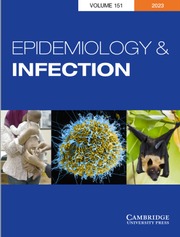Article contents
In vivo transfer of an R factor within the lower gastro-intestinal tract of sheep
Published online by Cambridge University Press: 15 May 2009
Summary
The transfer of an R factor from donor E. coli introduced into the rumen of adult sheep to strains of the coliform microflora resident post rumen in the lower gastro-intestinal tract was found to be greatly increased when the animals were subjected to a short period of starvation (ca. 24–48 h). This also resulted in coliform organisms containing the resistance determinants of the R factor being excreted for much longer periods, sometimes for months afterwards. As no antibiotic treatment was given to the animals during these experiments, possession of the R factor should have conferred no selective advantages on the host cells and other plasmids could possibly be transferred similarly in vivo in sheep or other ruminants and perhaps also within the gut of monogastric animals.
- Type
- Research Article
- Information
- Copyright
- Copyright © Cambridge University Press 1977
References
REFERENCES
- 4
- Cited by


